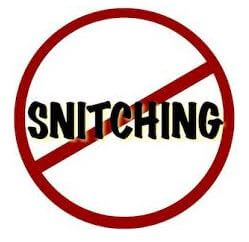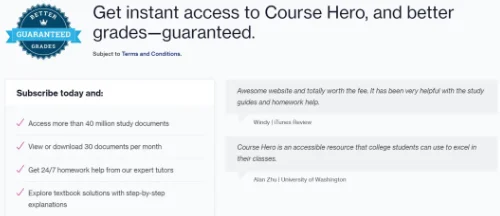Several companies are emerging by sharing course materials with students. These platforms assist the student in doing their homework and assignments by providing solutions to their answers. Students who use them fear they are breaking school rules and wonder whether Course Hero and Chegg notify the universities of the activities.
It should be noted that these websites are businesses that provide academic help to their customers, who are students. Even better, there are online tutors on these platforms who offer one-on-one help to any student who may bother to ask a specific question.
So, are they promoting cheating at schools and colleges? Well, these sites intend to equip the student with the right knowledge on handling a specific problem. However, many students are now abusing such an opportunity by plagiarizing their content.
The best practice is for the student to use such platforms as study guides only. The student is free to use their content and digital textbooks to gain knowledge and not cheating.
Does Chegg Notify your School?

You must be careful not to get in trouble for using Chegg because some of the answers are already submitted by other users.
Copy-pasting the same answer may attract plagiarism concerns leading to a penalty from your school. But can Chegg really snitch on you?
Chegg does not notify your school because it has strict privacy policies and is guided by its commitment to protecting its users.
The website will not snitch on you when you use it for homework or exam answers. However, that does not prevent your school from investigating the source of your answers if you violated the rules.
For instance, if the school suspects that you used its content at some point, it may ask Chegg to provide some details to support any ongoing investigation.
Such cases occur when the school becomes suspicious of plagiarism. The school may ask Chegg to give the details of all people who viewed their solutions.
As you do your homework, be careful not to plagiarize anything that you get from the Chegg platform, as your risk of being caught.
One must stay on the safe side by using their content sparingly. It sounds professional if you still perform further research to establish if the information given is valid or not.
You can spice it up with additional information if your research proves that they gave half-truth. You can omit any information if you find it irrelevant.

Does Course Hero notify your School?
For example, one can perform additional research on a particular question and give it a balanced approached without necessarily copying every content word to word and risking a penalty.
If the institution detects plagiarism in a student’s work, they may perform an investigation to determine the level of cheating. But does this have to do with Course Hero, and can they snitch on you and divulge information?
Course Hero does not notify your school if you use their services. In extreme cases, these colleges may legally approach Course Hero or its equivalent to furnish them with the details of particular areas of plagiarism as detected by their tool.
Such a case would be handled according to their privacy policies and user protection rules.

Such institutions are bound by the law to cooperate in upholding academic integrity.
Luckily, there is a law in the federal government that regulates the industry for the purpose of protecting the interests of the institutions and the students.
There are some details that Course Hero can tell your school on request.
It is vital to read and understand the terms and conditions of such sites before using them and avoid future errors and mistakes.
Also, avoid using their answers as yours. While this piece seeks to enlighten you on the dos and don’ts of the issue of online answers, we also advise you not to copy them.
How do Professors know that you used Chegg or Coursehero
One must be careful on how to use Chegg or Coursehero. To stay safe, you should use these platforms as study guides only and reduce your professor’s chances of knowing that you used them.

The only mistake that can land you in trouble with your instructor is to copy-paste everything from this platform and deliver the same to your professor as your own.
Universities have plagiarism scanners to detect if you copied content from Chegg or Course Hero, and you need to avoid copying.
The professor may check your content with Turnitin or SafeAssign for any similarity. Such tools will scan the internet and different databases to detect any similarities. As such, the professor may know who got the solution from CourseHero or Chegg.
If you were asking a question, the probability is that you wanted to get a solution to your concern. Among the searches could be either CourseHero or Chegg. Other professors may not care much but will try to alter the question to prevent the students from cheating.
One should avoid using an online textbook solution and submit it directly to the instructor. Here, the content will not pass Turnitin because it will let the instructor discover your content source.
An institution will consider using Chegg or CourseHero as cheating if a student decides to copy the given solution and do homework. If you are using such work that is not your own, remember to cite properly; otherwise, the instructor may take action.
Some schools have accounts on these two platforms. That implies that before giving any homework or assignments, they will also pause the same questions on these sites and get their solutions. If you happen to use them carelessly without making some modifications, then trouble lands on you.
Can Chegg see who viewed a question?
Chegg can see who viewed the question on its platform. Additionally, like any other website, Chegg may have mechanisms to collect the details of the device one uses, such as the IP address to access a specific question. However, they do not do anything much with such info.
This is basic for all websites that have users and use cookies. So, it should not be an issue of concern. Another example is to use your billing and email address to determine when you viewed any solution on their site.
However, you are not at risk using their site since it will not release such details to your school unless prompted to do so at request. And as we said, Chegg cannot snitch on you about that situation.
I do not think that the law allows Course Hero or Chegg to provide such details if the institution suspects that some of the students under its investigation are guilty of seeking their solutions from such sites.
Notably, Chegg is a public listed company that falls under the regulations of the federal government. About that, it must adhere to the best practices as guided by the federal law to implement the Honor Code policy.
Information on Chegg or CourseHero that is available to universities
When your academic integrity office begins to investigate, this is what they can easily see from the platform where you got the answer. A Company like Chegg is a legal service and has its policies and terms which seek to protect the users.
However, many people still think Chegg or Course Hero can snitch, but the truth is that any website is an open resource that has a lot of information available. For these two, here is a list of the info one can easily get by doing some research on the answers posted.
- The date and time when someone uploaded such a question.
- The date and time when the expert tutor answered that question.
- The email address and the username of the person who uploaded the solution.
- The name of the institution from what the student wrote on their account.
- The name of the person who uploaded the problem. That is true, especially when the student put the name on the account.
- The expert solution to the asked question.
Some of these platforms like Chegg have been accused in the past of promoting cheating. In fact, professors do not like Course Hero and others because they are deemed to help students violate honor code policies. However, I do not think they do. To me, they just provide study tools and help.
What the student does with them is another issue. When a student abuses the privilege of cheating, such platforms will deactivate the account and prevent such a student from using their services.
Furthermore, they collaborate with the school administration on any investigation and respond promptly. Chegg and CouseHero do corporate with institutions to facilitate any information that compromises academic integrity.
Can Chegg or CourseHero be tracked?
Many institutions of higher learning do not tolerate plagiarism. They use Turnitin to check the similarity index. If you used CourseHero or Chegg, is it possible for your school to track your sources and eventually penalize you?
Chegg or Course Hero cannot be tracked and the instructor cannot directly tell if you used Course Hero or Chegg to study or get answers. However, you will be caught if you copy word to word. There are tools most universities use to scan your content and detect plagiarism from the percentage of similarity.
The best way to avoid discovery is by using online answers as lessons and points. Then write your own.
You can only evade the tracking trap by writing your answers from your understanding after getting some hits from these two platforms.
Simply put, use them as study tools. Then, ensure that your answer sounds original and unique without altering the meaning of the sentence.
Plagiarism is the sure way of tracking your sources. Once the institution knows the source of your content, it will be easier to determine action.
.

I am an educational writer and blogger focussing on tech, education, and life improvement.
